Reports
Health
Wellness
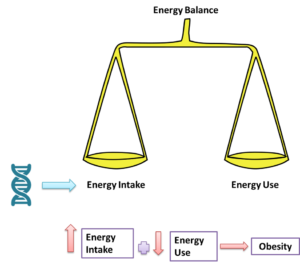
A healthy weight is maintained during a state of energy balance- when the energy intake of an individual matches the energy expenditure. Weight can accrue over a long period of time if the intake is higher than expenditure. Besides intake and expenditure, other factors such as age, basal metabolism, hormonal imbalance, and genetics also influence weight gain or weight loss.
Many humans have inherited genetic adaptations, which evolved to mitigate the ancestral exposure to cycles of feast and famine. Hence, the human body is very good at storing excess energy as fat and reluctant to lose valuable stores (fat) of energy. This is the basis of the ‘thrifty gene’ hypothesis, which explains why people easily put on weight on an excess calorie diet and find it very hard to lose it.
The heritability associated with energy intake among children is found to be between 47-69%. Twin studies showed that there was a genetic influence on the type of food consumed, along with satiety and food cue response.
There are many genes that have been shown to be associated with obesity and energy intake. Of particular significance is the FTO gene. Studies have shown that certain variants of this gene were associated with increased energy intake and increased hunger. Individuals with the abnormal FTO gene weigh at least 3kgs more than individuals who have the normal copy of the gene.
Individuals with an abnormal copy of the FTO gene eat more frequently, with a tendency to prefer calorie-dense foods and larger portions of food. People with the highest risk variant should exert portion control and eat a lot of food rich in fiber which would help quell the hunger. They should also consider frequent snacking in small quantities of low calorie, high protein, and high fiber foods to counteract the perpetual hunger they may be experiencing to maintain a stable glycemic index and stable levels of hunger and satiety hormones.
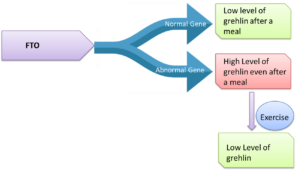
A hormone that plays a key role in satiety is ghrelin. Ghrelin is responsible for ‘hunger pangs’ as it signals the brain to eat. After a meal, the level of ghrelin is lowered and levels of another hormone, Leptin, are elevated resulting in a feeling of fullness. In an individual with the high risk variant of the FTO gene, the level of ghrelin remains high even after a meal, re
sulting in over eating. In such individuals, exercise has been shown to restore the level of ghrelin to normal levels.
Individuals with the abnormal FTO gene should be encouraged to follow a regular exercise pattern which will aid in lowering ghrelin levels and provide better satiety response.
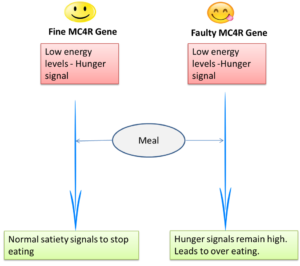
Another important gene that affects meal size and meal choice but not meal frequency is MC4R. When the energy levels drop in our body, the hunger center sends signals that inhibit MC4R and there is an increase in appetite. When the stomach is full after eating, satiety signals are sent by the satiety center that stimulates the MC4R to send signals to stop eating.
Overeating that is induced by distress, emotional eating, leads to binge eating which is highly prevalent in adults who are binge eaters or obese. Binge eating disorder is due to hypersensitivity to reward which results in overeating. The tendency to overeat or binge eat can be determined relatively strongly by analyzing the dopamine D2 receptor gene.
Dopamine is a neurotransmitter and its secretion is increased during emotional upheavals. From an evolutionary aspect, this hormone is released in response to some adverse condition, to prepare the body for a flight or fight response. Under normal circumstances, when dopamine binds to the DRD2 receptor, it should lower feelings of hunger and increase satiety. However, mutations in the DRD2 gene lead to a lower amount of DRD2 in the brain, which could lead to binge eating or overeating.
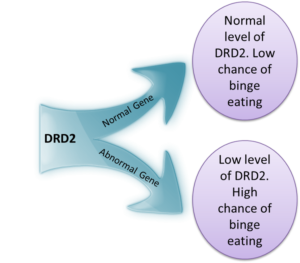
Individuals who carry the abnormal gene should consciously avoid overeating when feeling distressed or should store healthy snacks to eat at times of distress. Another study showed that deficits in the dopamine D2 receptor led mice to be inactive, which in turn lead to weight gain. Therefore, people with an abnormal gene should consciously stay active.
Regulating energy intake can moderate susceptibility to weight gain and obesity and is essential for people with a higher propensity to gain weight. Interventions that promote self-regulation of energy intake have the potential to control weight gain and also encourage healthy dietary habits. When designing intervention strategies, it is important to understand the genetic aspects involved as nearly 30% of obese individuals underreport their energy intake. The most effective way to fight obesity is through calorie restriction or lowering energy intake. People who carry abnormal genes for energy intake should follow mindful eating to ensure a balance in energy homeostasis.
Individuals who carry the abnormal gene should consciously avoid overeating when feeling distressed or should store healthy snacks to eat at times of distress. Another study showed that deficits in the dopamine D2 receptor led mice to be inactive, which in turn lead to weight gain. Therefore, people with an abnormal gene should consciously stay active.
Regulating energy intake can moderate susceptibility to weight gain and obesity and is essential for people with a higher propensity to gain weight. Interventions that promote self-regulation of energy intake have the potential to control weight gain and also encourage healthy dietary habits. When designing intervention strategies, it is important to understand the genetic aspects involved as nearly 30% of obese individuals underreport their energy intake. The most effective way to fight obesity is through calorie restriction or lowering energy intake. People who carry abnormal genes for energy intake should follow mindful eating to ensure a balance in energy homeostasis.
Find out which variations of these genes you carry and more at www.xcode.life
Nutrigenetics, fitness genetics, health genetics are all nascent but rapidly growing areas within human genetics. The information provided herein is to be read and understood in that context.
Cardiovascular disease is a group of diseases that involve the heart and blood vessels. There are a number of risk factors associated with this condition, including genetic risk factors with several mutations in several genes being associated. One such important and the independent risk factor is Homocysteine.
| Nearly 60% of the world’s heart disease occurs in India Indians are prone to premature coronary artery disease (CAD) with homocysteine found to be a significant independent risk factor for CAD in young patients. MTHFR gene polymorphism was found in 1/3rd of ischaemic stroke patients in India and was associated with a higher frequency of hyperhomocysteinemia compared with people without the polymorphism. Gene mutation implicated in homocysteine levels are significantly associated with CVD in Indians C677T MTHFR mutation was strongly associated with arterial stroke, with MTHFR allele evaluation aiding in reducing morbidity due to stroke. Multiple scientific studies have established high levels of homocysteine in the Indian population- as much as 80% according to one study. Poor maternal folate rate, indicated by plasma homocysteine levels which is a highly sensitive marker of folate levels, is associated with preeclampsia, stillbirth, preterm delivery, and spontaneous delivery. 60 to 90% of adolescents in India suffer from anemia, with folate deficiency being one of the major causative factors for nutritional anemia. 22 to 52% in India have folate deficiency in India. Conditions associated with folate deficiency, like neural tube defects with a prevalence of 1 to 5 per 1000 live births, are high in India. |
Folate (vitamin B9) is responsible for converting the harmful homocysteine to its useful form, methionine. Methionine is important for many essential bodily functions such as the production of DNA and RNA, cell, and tissue growth. Though dietary intake of folate is generally inadequate in India, that is not the only reason for high homocysteine levels. Genes also play an important role.

Folate is present in an inactive form in the body and is converted to its active form by the enzyme Methyl Tetra hydro Folate Reductase (MTHFR). The active form of folate is necessary for the conversion of homocysteine to methionine. The gene MTHFR plays a role in the production of the MTHFR enzyme and any genetic variation in this gene could alter the level and activity of the enzyme in the body. It has been shown that the prevalence of MTHFR gene mutation is high in India, which when combined with low dietary folate intake can lead to very high levels of homocysteine and other associated conditions.

Maintenance of adequate folate levels is extremely important during pregnancy, infancy, and adolescence. Lack of methionine can lead to improper DNA synthesis and disruption in gene regulation that could lead to birth defects like neural tube defects, which are associated with folate deficiency.
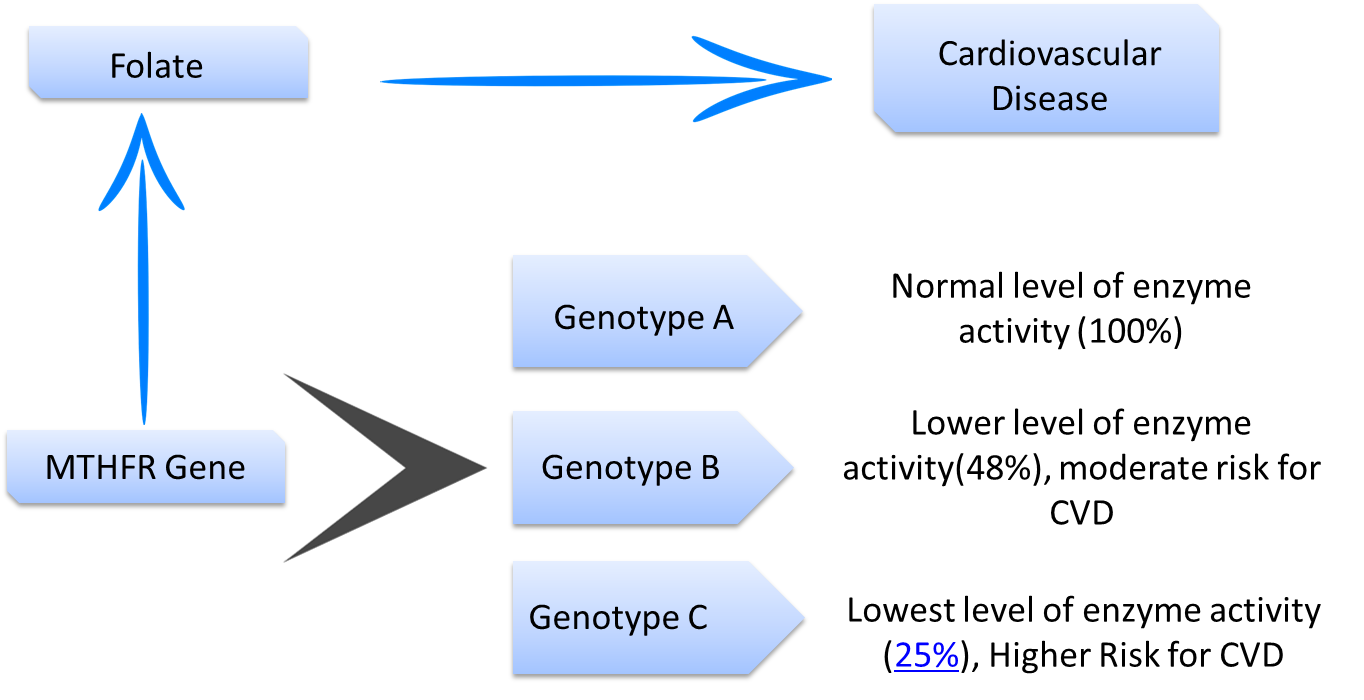
Asians show a high prevalence of 677C>T polymorphism in the MTHFR gene. People with genetic variants that are at high risk for folate insufficiency should supplement their diet with rich sources of folate. Fruits and vegetables are good sources of folate, however, in India, overcooking vegetables leads to loss of folate. Fortified cereals, grains, and cornmeal are sources of folic acid, which is a synthetic form of folate. The folate from the diet will compensate for the lowered levels due to gene polymorphism.
The type of MTHFR gene has been shown to influence the Active Folate levels in blood. Want to know what type of MTHFR gene you have? Try Xcode’s nutrigenetics test which can tell you what versions of the MTHFR gene are in your DNA. You can also learn about how your genes may influence other traits, including your risk for certain diseases. Write to us at hello@xcode.life to find out more.
Food without salt is tasteless and unappetizing. But, too much salt intake is not good for health. Of course, our body needs salt but not as much as we consume. Only one gram of salt is essential for an adult in a day and even lesser is the need for salt in children. But people take a lot more salt than is medically recommended which is a concern.
1. High Blood PressureThe pressure that the blood puts on the blood vessels is known as blood pressure. Many reasons like too much body weight, no exercise as well as too much salt intake could lead to the increase in blood pressure. This could lead to various health complications like a stroke or a heart attack. People think that as they grow older, it is natural for the blood pressure to grow. It is not so. If you control the daily amount of salt in your food, you can keep your blood pressure under check.. |
2. Stomach CancerIf a person is high on salt consumption, he/she is more susceptible to getting stomach cancer. A bacteria known as H. Pyroli is the cause for stomach cancer. Now too much salt intake can damage stomach lining, which in turn would leave the stomach vulnerable to H. Pyroli, and increase the chances of developing stomach cancer. |
3. OsteoporosisA condition where the bones lose its density and become thin or brittle is known as osteoporosis. Many people around the world suffer from this disorder. Calcium is stored in our bones. Too much salt intake causes this calcium to be flushed out of the body through urine causing the bones to turn weak and brittle. This disorder is very common in women after menopause but this can be checked by consuming lesser amount of salt in the daily diet. |
4. Diseases of the KidneyThe kidneys maintain the balance of fluids in the human body. They monitor the amount of fluid which is flushed out from the blood into the urine. Too much salt intake can cause malfunctioning of the kidneys. Also when calcium from the bones is flushed out by the urine, it could cause a deposit to form in the kidneys leading to kidney stone. |
5. Retention of WaterToo much salt in the diet could lead to water being retained in the body which could lead to bloating. This can be cured by reducing salt consumption |
Hence to reduce health hazards and to lead a normal life it is advisable that people eat more fresh food rather than tinned and junk food as they all have huge quantities of salt in them and thereby increasing your overall salt consumption levels.
